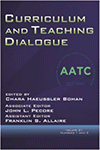
Curriculum and Teaching Dialogue
Vol. 21 # 1 & 2
Edited by:
Chara Haeussler Bohan, Georgia State University
John L. Pecore, University of West Florida
Franklin S. Allaire, University of Houston-Downtown
A volume in the series: Curriculum & Teaching Dialogue. Editor(s): Chara Haeussler Bohan, Georgia State University. John L. Pecore, University of West Florida. Franklin S. Allaire, University of Houston-Downtown.
Published 2019
Curriculum and Teaching Dialogue is a peer-reviewed journal sponsored by the American Association for Teaching and Curriculum. The purpose of the journal is to promote the scholarly study of teaching and curriculum. The aim is to provide readers with knowledge and strategies of teaching and curriculum that can be used in educational settings. The journal is published annually in two volumes and includes traditional research papers, conceptual essays, as well as research outtakes and book reviews. Publication in CTD is always free to authors. Information about the journal is located on the AATC website http:// aatchome.org/ and can be found on the Journal tab at http://aatchome.org/about-ctd-journal/.
CONTENTS
Acknowledgments. Presidential Address: Reenvisioning Industrial Era Methods Like Hypothesis-Experiment-Instruction to Meet Current Innovation Age Learning Needs, John L. Pecore. AATC Keynote Address—The Marcella Kysilka Lecture: Ethics, Curriculum, Teaching, and Learning in a Hostile Policy Environment: Against the Corporate Takeover of American Schools, Deron Boyles. VOLUME 21, NUMBER 1. Editorial Remarks: Toward Inclusive Curriculum and Teaching, Chara Haeussler Bohan. LGBTQ Inclusion and Exclusion in State Social Studies Standards: Implications for Critical Democratic Education, Steven Camicia and Juanjuan Zhu. An Inclusive Educator Licensure Pathway to Meet the Educational Needs of All Students: Dual-Residence Education Action Model, Tachelle Banks, Elena Andrei, and Jennifer Dohy. A Collaborative Journey Toward Inclusive Teacher Education Programs, Jie Zhang, Allison M. Wright, Eun-Joo Kim, and Janka Szilágyi. Culture Circles as a Practice of Freedom, Kevin Russel Magill and Arturo Rodriguez. The Goals and Challenges of Doctoral Student Elementary Social Studies Methods Instructors, Stephanie Schroeder and Elizabeth Washington. Scholarship or Teaching: Understanding History as an Academic Discipline or as a School Subject, Justin Detmers. The Enduring Appeal of Cliff Notes, Robert L. Hampel. Part 1: A Short History of CliffsNotes, Robert L. Hampel. Part 2: Making a Long Story Short (and Meaningful): CliffsNotes and Literary Analysis, William E. Lewis. VOLUME 21, NUMBER 2. Editorial Remarks: Inspired Teaching Inspires Action, John L. Pecore. Recognizing Kierkegaard’s Existential Despair Within the Lives of Early-Career Teachers, Aaron S. Zimmerman. A Mathematics Classroom of Caring Among a Black Male Teacher and Black Male Students, Jason G. Hunter and David W. Stinson. When Does Free Speech Become Offensive Speech? Teaching Controversial Issues in the Classrooms, Momina Khan. Forging Pathways to Understanding: Using an Ecological Lens to Frame a School Reform Initiative, Alan Tinkler and Barri Tinkler. Characterizing Adjunct Faculty Members’ Call to Teach in Higher Education, Molly Smith. Using Music to Inform Researcher Positionality Statements, Alexander Pope and Timothy Patterson. Investigating Intentionality and Mindfulness of Storytelling as Pedagogy: What Student Evaluations Reveal About My Practice, Denise McDonald. OUTTAKES. (Un)paralleled: Methodological Tensions of Researching as an Educator Among Police, Tara Meister. Outrageous Statements, Poker Faces, and the Qualitative Interview, Joseph Zajdel and Daniel R. Conn. Open-Ended Questions in Qualitative Research: Keeping an Open Mind as Researchers, Twyla J. Tasker and Anica Cisneroz. Tensions Between Urgency and Scaffolding Students Into Social Justice Education, Ganiva Reyes and Scott A. Sander. Squeezing Information From a Failed Research Study, Jo Bennett. Our Professional Obligations in the Education “Marketplace”, Crystal D. Howell. BOOK REVIEWS. Blood at the Root: A Racial Cleansing in America by Patrick Phillips Reviewed by Katherine Perrotta. Focus on Thinking: Engaging Students in Higher-Order Thinking by Paul A. Wagner, Daphne D. Johnson, Frank Fair, and Daniel Fasko, Jr. Reviewed by Wade Morris. Teaching for Inclusion: Eight Principles for Effective and Equitable Practice by Srikala Narajan Reviewed by Cristy Sellers Smith. Cultivating a Culture of Learning: First Book in the Contemplative Practices, Pedagogy, and Research in Education Series edited by Kathryn Byrnes, Jane E. Dalton, and Elizabeth Hope Dorman Reviewed by Bryan E. Cichy-Parker. Impacting Teaching and Learning: Second Book in the Contemplative Practices, Pedagogy, and Research in Education Series edited by Elizabeth Hope Dorman, Kathryn Byrnes, and Jane E. Dalton Reviewed by Ramya Sivaraj. The Teaching Self: Third Book in the Contemplative Practices, Pedagogy, and Research in Education Series edited by Jane E. Dalton, Elizabeth Hope Dorman, and Kathryn Byrnes Reviewed by Eve Zehavi. About the Authors.
-
Paperback978-1-64113-812-3
Web price: $45.04 (Reg. 52.99)
-
Hardcover978-1-64113-813-0
Web price: $80.74 (Reg. 94.99)
- eBook978-1-64113-814-7

-
 Curriculum and Teaching Dialogue
Volume 24, Numbers 1 & 2, 2022
Curriculum and Teaching Dialogue
Volume 24, Numbers 1 & 2, 2022
-
 Curriculum and Teaching Dialogue
Volume 25, Numbers 1 & 2, 2023
Curriculum and Teaching Dialogue
Volume 25, Numbers 1 & 2, 2023
-
 Curriculum and Teaching Dialogue
Vol. 18 # 1 & 2
Curriculum and Teaching Dialogue
Vol. 18 # 1 & 2
-
 Curriculum and Teaching Dialogue
Vol. 19 # 1 & 2
Curriculum and Teaching Dialogue
Vol. 19 # 1 & 2
-
 Curriculum and Teaching Dialogue
Vol. 20 # 1 & 2
Curriculum and Teaching Dialogue
Vol. 20 # 1 & 2
-
 Curriculum and Teaching Dialogue
Vol. 22 # 1 & 2
Curriculum and Teaching Dialogue
Vol. 22 # 1 & 2
-
 Curriculum and Teaching Dialogue
Vol. 23 # 1 & 2
Curriculum and Teaching Dialogue
Vol. 23 # 1 & 2

